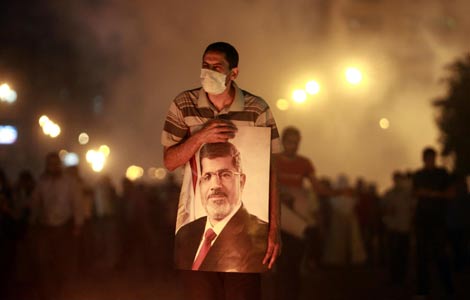US does not plan decision on Egypt coup
|
 |
|
An injured supporter of deposed Egyptian President Mohamed Mursi carries a poster of Mursi as they run from tear gas fired by riot police during clashes on the Sixth of October Bridge over the Ramsis square area in central Cairo in this July 15, 2013 file photo.[Photo/Agencies] |
U.S. Deputy Secretary of State William Burns delivered the message in separate briefings to senior members of the U.S. Senate and the House of Representatives, several lawmakers told reporters after meeting the number two U.S. diplomat.
The question of whether a military coup took place has vexed the White House, which generally wants to be seen as supporting democratically elected leaders but which had no love lost for ousted Egyptian President Mohamed Mursi.
Under U.S. law, most aid must stop to "any country whose duly elected head of government is deposed by military coup d'etat or decree" or toppled in "a coup d'etat or decree in which the military plays a decisive role."
However, the law does not actually oblige the White House to make a decision.
"The law does not require us to make a formal determination as to whether a coup took place, and it is not in our national interest to make such a determination," said an Obama administration official who spoke on condition of anonymity.
Speaking after the session with Burns, Senator Bob Corker, the top Republican on the Senate Foreign Relation Committee, said the Obama administration might never make a decision on the matter and suggested that U.S. law needed to be changed.
"No determination has been made. It's possible that no determination will ever be made," Corker told reporters.
The Egyptian armed forces deposed Mursi on July 3 after huge street protests against his rule, clearing the way for last week's installment of an interim Cabinet charged with restoring civilian government and reviving the economy.
Current and former officials have said the administration has no appetite for terminating aid, which runs at about $1.55 billion a year, $1.3 billion of which goes to the military, for fear of antagonizing one of Egypt's most important institutions.
Nor does it wish to increase instability in the most populous Arab nation, which is of strategic importance because of its peace treaty with close U.S. ally Israel and its control of the Suez Canal, a vital waterway for the U.S. military.
"Egypt is a very strategic country in the Middle East and what we need to be is an instrument of calmness," Corker told reporters, suggesting that the U.S. laws be changed so as to allow greater flexibility.
"We need to deal with our laws in such a way that allow us to continue to be that instrument of stability in the region," he added. "It's likely that very soon we will try to deal with this issue, which is a quandary, legislatively."
- Egypt army call signals possible crackdown
- Death toll rises to 15 in rival clashes in Egypt
- Bomb at Egypt police station kills 1, injures 17
- Egypt starts amending constitution
- 2 killed, 7 injured as protesters clash in Egypt
- Egypt's presidency contacts political forces
- Egypt Islamists continue rallies





















